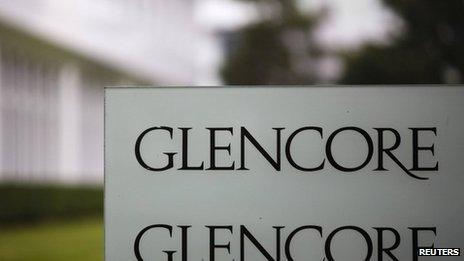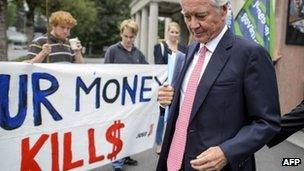Glencore and Xstrata: How much power would they have?
- Published

Glencore trades and markets many of the world's most important commodities
A luxury Mayfair hotel, a Middle East envoy, an Arab sheikh, and billionaires in charge of the world's most lucrative commodities.
Redolent of a scene from a John Le Carre novel, maybe. But real recent events have seen one-time UK Prime Minister Tony Blair, the Qatar Prime Minister Sheikh Hamad bin Jassim bin Jabr Al Thani, and the giant business of Glencore and Xstrata, engaged in trying to broker a union of the two companies.
With ingredients like this, it is clear something of global significance is at stake.
If you need to ask the question why should you care about a merger between Glencore and Xstrata - all you need to do is look around you.
Just about anything could have been produced, traded, or marketed by Glencore.
Influence
Rice, wheat and barley, zinc, copper, and oil are among the vast range of raw materials it has a hand in passing round the world.
Its own website summarises its breadth: "Glencore has worldwide activities in the production, sourcing, processing, refining, transporting, storage, financing and supply of metals and minerals, energy products and agricultural products."
Glencore has more ships than the British Royal Navy and handles 3% of the world's oil consumption through its operations in 40 countries from Australia to Argentina.

Xstrata chairman John Bond faces protesters outside company headquarters in Switzerland
Xstrata, too, has a huge presence.
As one of the world's largest mining and metals companies, its website explains it is "a major producer of seven commodities used in everything from constructing buildings and delivering electricity, to developing jet engines and mobile phones".
It is active in more than 20 countries and employs 70,000 people. Put together with Glencore, that would give a merged company around 130,000 employees and revenue of some $200bn (£130bn).
The business would be number one in coal and zinc and lead - and is expected to become the biggest independent producer of copper.
Winners and losers
Although the key Xstrata shareholder, Qatar Holdings, with its 12% stake, was asking for a higher offer than the 3.05 Glencore shares for each Xstrata - it has said it would accept a minimum of 3.25 Glencore shares - most shareholders should benefit from the deal. Glencore says the merger will enhance profits in the first year by some $500m.
But what's good for shareholders and executives isn't necessarily good for customers and manufacturers. China, for example, buys a lot of commodities from Glencore and Xstrata, and may fear prices will rise.
So many goods controlled by one company raises the prospect of competition investigations in territories where the companies trade.
Mining analyst John Meyer, from Fairfax Investment Bank, has been following Glencore's and Xstrata's activities for more than a decade.
He points out that Glencore and Xstrata would not be the biggest company of its type. BHP Billiton is much bigger, and a newly merged "Glenstrata" would stand fourth in the world.
So, the two companies would argue that there is little for the competition authorities to worry about.
Unpopular
China, however, could be a different matter, says Mr Meyer. "China likes to control prices and doesn't want to see any of the big boys getting any bigger," he said.
But he does not believe there is much the European Commission, for example, could object to. Mr Meyer said: "A previous investigation in 2006 concluded that the two were pretty much already one entity. It is hard to see how they can change that view.
"A lot hinges on the attitude of Europe's steel producers. But with many of Glencore's customers happy with the way it operates, there may be no problem here, either."
Xstrata, though, is politically unpopular in certain areas.
Its activities have sparked protests in countries including the Dominican Republic and Peru - where two demonstrators died - and the latest meeting of the Xstrata board also attracted opponents, some carrying a placard saying: "Your money kills".
These factors are unlikely to weigh too heavily on Xstrata, Glencore and their shareholders as they decide whether to go along with the wishes of the two companies' directors.
- Published10 September 2012